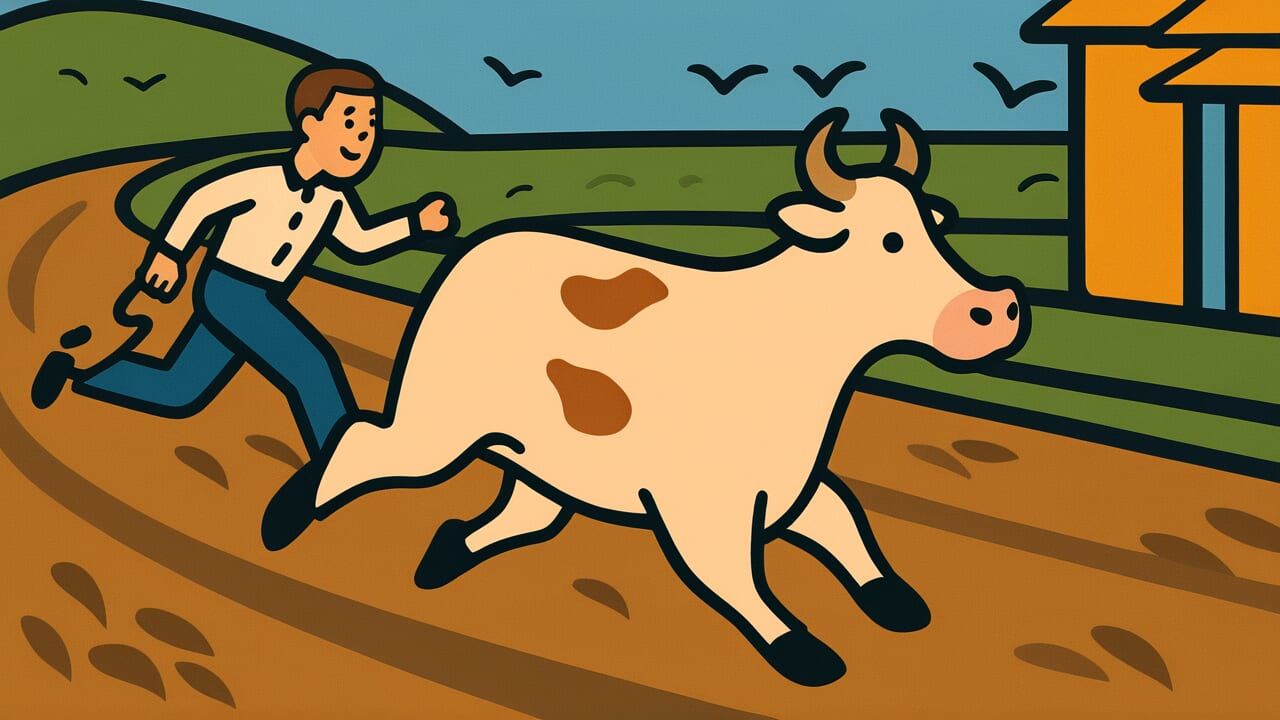How to Read “Chasing a cow, chased by a cow”
Ushioi ushi ni owaruru
Meaning of “Chasing a cow, chased by a cow”
“Chasing a cow, chased by a cow” means that those who corner others will eventually find themselves cornered. People who treat others harshly or abuse their power to make others suffer will eventually face the same situation themselves. This proverb teaches the principle of karma.
This proverb is used as a warning to people who behave arrogantly. It also explains situations where positions have reversed. The message is clear: even if you’re in a superior position now, circumstances can change.
This lesson remains relevant in modern society. A boss who commits power harassment may later lose their position. Someone who treats others unfairly may experience the same treatment themselves.
The proverb reflects a deep understanding of human nature. The positions of pursuer and pursued are not fixed. They can easily switch during the course of life.
Origin and Etymology
No clear written records explain the origin of this proverb. However, we can make interesting observations from how the phrase is constructed.
“Ushioi” refers to a person who drives cattle. This means someone who makes cows work by herding them. In agricultural society, cattle were valuable labor. The person driving the cow held a superior position and had the power to control the animal at will.
The clever part of this expression is the reversal: “ushioi” becomes “ushi ni owaruru” (chased by a cow). The pursuer becomes the pursued. The dramatic reversal of positions is expressed through cows, animals familiar from farming. This is what makes the proverb so skillful.
In Japanese rural society, ideas of karma and position reversal were deeply rooted. People understood from daily life that those with power cannot maintain that position forever. This universal truth about life is expressed through the familiar image of cattle.
The rhythm of the words is also notable. “Ushioi, ushi ni, owaruru” flows pleasantly and is easy to pass down orally.
Usage Examples
- That manager who cornered his subordinates so harshly is now being cornered by the company himself. It’s truly “Chasing a cow, chased by a cow.”
- He kept making unreasonable demands on business partners. Now that positions have changed, it’s “Chasing a cow, chased by a cow”—the same is being done to him.
Universal Wisdom
“Chasing a cow, chased by a cow” reveals a universal truth. It shows the instability of power relationships in human society and the cycle of cause and effect.
Why do people abuse their power when they’re in a superior position? It’s because they mistakenly believe their current position will last forever.
The moment people gain power, they feel like they’ve become special. They tend to lose their imagination for others’ feelings. But this proverb calmly reminds us: the position of pursuer is never permanent.
Looking back at human history, the rise and fall of those in power has repeated endlessly. Today’s ruler becomes tomorrow’s loser. This cycle remains the same at the individual level, organizational level, and national level. Our ancestors saw through this unavoidable truth.
This proverb has been passed down for so long because it’s not just a moral lesson. It captures a structural truth about human society.
Positions are fluid. Today’s aggressor can become tomorrow’s victim. This recognition is what makes people humble and creates the source of compassion for others.
When AI Hears This
The phenomenon of a person chasing a cow being chased back by that cow expresses the core of chaos theory with surprising accuracy. In chaotic systems, tiny differences in conditions create large changes in results.
For example, if the angle of chasing the cow differs by just one degree, the cow’s escape direction changes, and the person’s position changes too. These tiny differences accumulate. Before you know it, the arrangement has flipped so the cow is chasing the person. This is initial condition sensitivity—the butterfly effect.
What’s more interesting is that this reversal isn’t accidental. It exists as a specific state the system is drawn to—an attractor.
When two moving objects, cow and person, interact in limited space, their positional relationship keeps changing complexly. But if you draw their trajectory mathematically, it converges repeatedly on the state pattern of “pursuer and pursued switching places.”
This isn’t just random reversal. The act of chasing itself triggers the other’s movement, changes spatial arrangement, and guides the entire system toward a specific state.
In other words, the more you chase, the closer you get to the result of reversal. This structure is built into the system. In human relationships too, the act of strongly cornering someone creates a situation where you yourself become cornered. This happens because the nature of chaotic systems appears in social systems as well.
Lessons for Today
This proverb teaches you not to be arrogant about your current position. It reminds you to always consider things from the other person’s perspective.
At work, at school, at home—we live within various power relationships. Boss and subordinate, senior and junior, parent and child. These relationships may sometimes seem fixed. But life is long, and situations always change.
The person you have an advantage over today might be in a position to evaluate you tomorrow.
That’s why this proverb asks you: How are you using that power now? Are you using it to corner people, or to support them? That choice will eventually shape your own future.
Fortunately, this lesson isn’t only negative. Acts of kindness toward others will also return to you eventually.
Don’t corner people—extend a helping hand instead. That accumulation will become your support when you face difficulties.
Don’t fear the reversal of positions. Instead, choose actions you can be proud of in any position. That is the wisdom of living that this proverb shows.



Comments